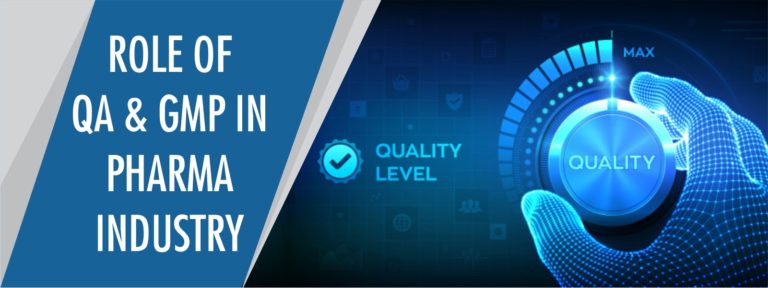Quality Assurance :
In the pharmaceutical industry, quality assurance (QA) is essential for ensuring that
pharmaceutical products are manufactured to a safe and consistent standard. QA is an area that refers to any aspect that may affect a drug’s quality during its research, development and manufacturing
. It is the sum total of the organised arrangements that will ensure that that the product manufactured is of the quality required for their intended use.
A drug that doesn’t work as intended or that is defective in some way can present a threat to public health. Ensuring that pharmaceutical products are safe and effective is the primary goal of any pharmaceutical company’s QA department.
A QA professional implements various measures at manufacturing facilities, such as calibrating equipment, maintaining documentation, and conducting quality tests, that are covered by GMP and that can help a facility pass its inspection.QA professionals maintain documentation to ensure regulatory compliance
The person consuming the drug wants assurances that the pharmaceutical drugs they take are safe and useful. If a pharmaceutical manufacturer is found not to be in compliance with QA regulations, or if they have created a pharmaceutical product that is either unsafe or doesn’t work as intended, the public may lose faith in the quality of that company’s products.
By ensuring that measures are in place to guarantee product quality, a QA professional plays a significant role in reassuring the public that a certain drug—and, by extension, that drug’s manufacturer—can be trusted. In turn, this helps
pharmaceutical companies maintain their public reputations, which is essential for business success.
Good manufacturing practice (GMP) is a concept that ensures products are consistently produced and controlled according to quality standards. It is designed to minimize the risks to the patient involved in any pharmaceutical production.
Basic Outlines of GMP.
- Manufacturing facilities must maintain a clean and hygienic manufacturing area, including laboratories and storage. Manufacturing facility design, operating principles and environmental conditions must be controlled in order to prevent cross contamination of drug products, and to prevent cross contamination from labelled or unlabelled material or products.
- Manufacturing processes must be clearly defined, validated and controlled to ensure consistency and compliance with specifications. Any changes to the process are evaluated from a patient safety and product quality perspective, and any approved change that may affect the quality of the drug are qualified or validated as necessary.
- Instructions and procedures must be written in clear and unambiguous language (Good Documentation Practices). Operators should be trained to carry out the production and control of products according to documented and approved procedures.
- Records should be made during manufacture and quality control, demonstrating that all the necessary steps required by the defined procedures and instructions were executed as defined, and that the specified quality attributes of the products have been met. Deviations are investigated and documented.
- The process should remain in a state of control throughout the product lifecycle and improvements done as needed. Records of manufacture (including distribution) are retained in a comprehensible and accessible format that can trace the complete history of a batch.
- A system must be available for recalling any batch from sale or supply. Complaints about marketed products should be examined, the causes of quality defects investigated, and appropriate measures taken with respect to the defective products and to prevent recurrence.
- GMP guidelines are not prescriptive instructions on how to manufacture products. They are a series of general principles that must be applied during manufacturing. When a company is setting up its pharmaceutical quality system, manufacturing processes and control, there may be many ways to fulfil GMP requirements
Importance of GMP
Poor quality drugs can be a disaster for both patients and governments from a health and a cost perspective. If companies cannot manufacture appropriate quality products due to GMP issues (the most common reason) there is a high risk of drug shortage, which unfortunately affects patients who cannot get their prescribed medication when they need it.
The pharmaceutical industry has a responsibility to ensure their safe and sufficient supply, and this must be taken into consideration in pharma engineering and consulting projects from the outset.
Additionally, GMP can help boost pharmaceutical export opportunities. The majority of countries worldwide only accept the import and sale of medicines that have been manufactured to internationally recognised GMP standards.
Investing in GMP means investing in quality medicine. It saves costs, minimizes risks, and improves the standard of drugs worldwide.




